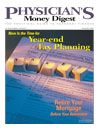Beware of the Alternative Minimum Tax
The reason:
Wall Street Journal
Did you know that your nest egg may be injeopardy? A provision in the federaltax code known as the alternative minimumtax (AMT), which exists alongside regularincome taxes. According to the , theprovision was originally created by Congress to keepwealthy individuals from avoiding taxes, but now itdisallows almost all deductions, burdening high-payingtaxpayers. Because AMT rates and exemptionshave not been adjusted for inflation over the years,millions of taxpayers for whom the provision wasnever intended are beginning to feel its dire impact.The US Treasury Department notes that this past year1.7 million taxpayers paid the AMT and approximately1 million more will pay in 2005.
Calculate Your Risk
Physicians who have more long-term capital gainsand deductions relative to their ordinary income aremore likely to pay the AMT. Retirees are especially atrisk because their income usually declines while theystill have large deductions for state and propertytaxes. To determine if you're in the AMT bracket,calculate both your regular income taxes using IRSForm 1040 and the AMT using IRS Form 6251. Ifyour AMT is higher than your regular taxes, that isthe additional amount that you must pay.
Under the AMT, much more of your income istaxed because the only deductions you can take arefor charitable contributions and mortgage interest.Individuals who live in a high tax state or who havehigh property taxes or other large deductible expenseswill more likely fall under the AMT because thosetaxes and expenses are deductible under the regularincome tax system but not the AMT.
Wall Street
Journal
Retirees who begin utilizing large long-term capitalgains as income also get hit with the AMT. Thelong-term capital gains rate is 20% under both theAMT and the regular tax system. The notes that in the rare case that your onlyincome is from long-term gains, you would not haveto pay the AMT. However, most people's deductionsbring their regular taxes below the AMT.
Exercising incentive stock options also puts you atrisk. When you employ a stock option under the regulartax system, you do not owe taxes until you sellyour shares, at which time you are taxed on any gains.Under the AMT, you pay taxes on the spread betweenthe exercise price (ie, the price at which you useoptions to buy a stock) and the market price.
Preventive Measures
One more
piece of advice:
Unfortunately, no relief from the AMT is in sight,and while many policy and tax analysts have beenpressing for AMT revision, most concede that it isunlikely. However, you can take preventive steps toprotect your retirement savings. Income from a pension,dividends, or an IRA can help keep you out of theAMT because these sources are taxed at ordinaryincome tax rates. Also, time your state tax paymentsto coincide with a high-income year. Accelerate orpostpone large deductions by matching them to a yearin which your income is higher than usual. The sameapplies to long-term gains: Draw them down over anumber of years, rather than in a lump sum. Exercise incentive stock options whenthe market price is low, or in stages over a number ofyears. Better yet, sell your shares in the same year youexercise the options.
